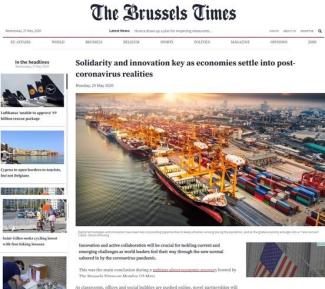Solidarity and innovation key as economies settle into “new normal”
UNIDO made a strong contribution to a live webinar entitled “Economic Transition into the ‘New Normal’: How can International Organizations help European Economies Bounce Back?” held on 25 May. The webinar was convened by The Brussels Times and Huawei, attracting around 6,000 live views.
The online debate among the key European and international bodies provided insights on how to overcome the unprecedented challenges ahead of us, and share good practices already being implemented in response to Covid-19. Bernardo Calzadilla-Sarmiento, Director of the UNIDO Department of Trade, Investment and Innovation, noted that 1.6 billion people are at risk of unemployment, while also observing disruption to global value chains, investment and demand. He acknowledged that the outbreak presented a challenge to implementation of the Sustainable Development Goals (SDGs), with 24 million people at risk of poverty as a result, and that achieving gender equality faces steep challenges exacerbated by the pandemic.
Isabelle Mauro, World Economic Forum (WEF), emphasized the importance of regulation and dialogue between the public and private sectors, while Jaroslaw Ponder, International Telecommunication Union (ITU), stressed the need for addressing the digital divide. Abraham Liu, Huawei, underlined how AI is key to providing economic and social solutions in the post-Covid era, while Nada Sirotic, Permanent Representation of Croatia to the EU, urged greater international cooperation, data sharing and trust.
It was stressed that the Fourth Industrial Revolution would be “at the core” of the “new normal” following the outbreak. “The data sector is coming on very strongly, but we need the regulatory framework to decide how we go about it,” Mr. Calzadilla-Sarmiento underlined. “Artificial intelligence has to be for the good…we have to put technology on the right track for bringing it to our society, not leaving anyone behind,” Mr. Calzadilla-Sarmiento urged.
Read the Brussels Times article here.
Watch the webinar in full here.

